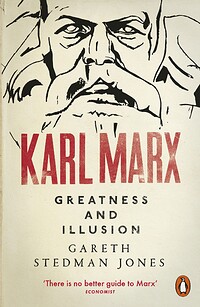Status
Call number
Genres
Publication
Description
As much a portrait of his time as a biography of the man, Karl Marx: Greatness and Illusion returns the author of Das Kapital to his nineteenth-century world, before twentieth-century inventions transformed him into Communism's patriarch and fierce lawgiver. Gareth Stedman Jones depicts an era dominated by extraordinary challenges and new notions about God, human capacities, empires, and political systems--and, above all, the shape of the future. In the aftermath of the Battle of Waterloo, a Europe-wide argument began about the industrial transformation of England, the Revolution in France, and the hopes and fears generated by these occurrences. Would the coming age belong to those enthralled by the revolutionary events and ideas that had brought this world into being, or would its inheritors be those who feared and loathed it? Stedman Jones gives weight not only to Marx's views but to the views of those with whom he contended. He shows that Marx was as buffeted as anyone else living through a period that both confirmed and confounded his interpretations--and that ultimately left him with terrible intimations of failure. Karl Marx allows the reader to understand Marx's milieu and development, and makes sense of the devastating impact of new ways of seeing the world conjured up by Kant, Hegel, Feuerbach, Ricardo, Saint-Simon, and others. We come to understand how Marx transformed and adapted their philosophies into ideas that would have--through twists and turns inconceivable to him--an overwhelming impact across the globe in the twentieth century.--… (more)
User reviews
There's plenty of detail, and much of it is interesting and useful. The frame is ludicrous, though. One paragraph on page 241 is dedicated to telling us what Marx achieved: being the first person to systematically explain capitalism as a system; to explain capitalism as a history; to explain its concrete effects on laborers and others; to emphasize its effects on our subjectivity and desires; to reveal its revolutionary destructiveness (more famously described by Schumpeter). Most of the rest of the book is dedicated to explaining that Marx was somehow full of shit. Now, that seems a bit wrong. Do we really need a hundred pages detailing Marx's empirical failings as a writer for the Neue Rheinische Zeitung? That's useful, yes. But it's funny to read paragraphs like the one on page 241, and then realize that Gazza thinks Marx was a *failure*.
So, this book is great, because it isn't hagiographical. It is good on the shifts in Marx's own political positions, and it would be great if ultra-leftist types could read it and reconsider their revolution-or-nothing positions. But they won't read it, because of the idiotic satanographic framing that is somehow meant to show us the 'real Karl' instead of St. Marx. Probably somewhere in between.
Oh, and on Capital, Gazza is terrible. Naughty Gazza!
